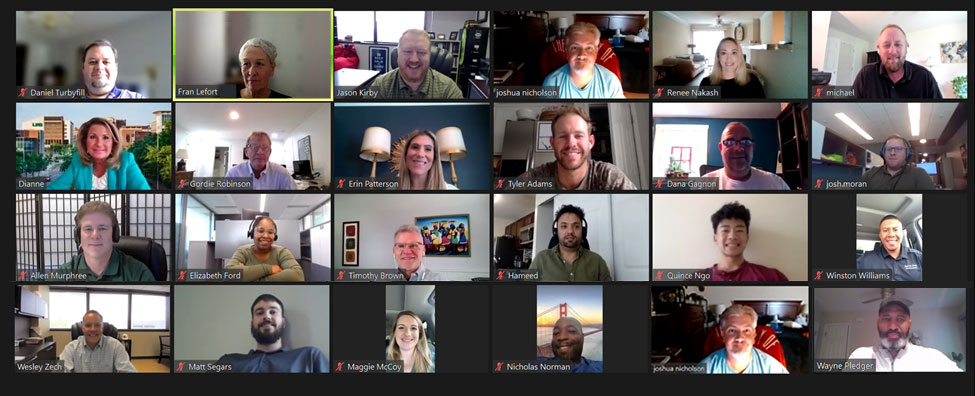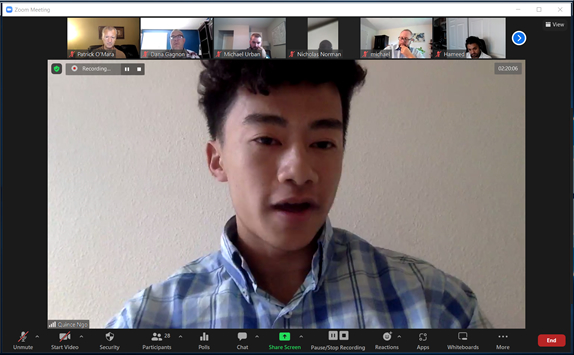The Construction Engineering Management (CEM) program received a total of 36 new master’s students during the August 19 and August 20 Graduate Orientation. This was an excellent opportunity for the incoming academics to meet the CEM faculty, staff, and their new classmates, in a safe and convenient virtual setting.
 The Boot Camp experience marks the official start of a track of study in which students will typically take five semesters of fully online graduate courses to earn a Master of Engineering (MEng) degree with a concentration in CEM in 19 months. However, there is a small percentage of students that opt to fast-track and complete their plan of study in 12 months. The CEM degree is offered through the Department of Civil, Construction, and Environmental Engineering (CCEE) and the incoming cohort of working professionals who attended the fall 2022 event are pictured above.
The Boot Camp experience marks the official start of a track of study in which students will typically take five semesters of fully online graduate courses to earn a Master of Engineering (MEng) degree with a concentration in CEM in 19 months. However, there is a small percentage of students that opt to fast-track and complete their plan of study in 12 months. The CEM degree is offered through the Department of Civil, Construction, and Environmental Engineering (CCEE) and the incoming cohort of working professionals who attended the fall 2022 event are pictured above.
This is the 29th formal Boot Camp hosted by CEM since its inception as an online program in 2009. Since then, CEM has continued to flourish with over 139 active students and 755 alumni. In addition, CEM and the School of Engineering (SoE) have received several prestigious recognitions over the years:
- US News and World Report – Excellence in online engineering education.
- Online College Rankings Consensus – Best online construction engineering management concentration within a Master of Engineering Program.
- Online Masters – One of the best online master’s in construction management.
- Affordable Colleges Online – Outstanding affordability in online engineering education.
During day one, everyone at orientation had a chance to learn something significant about each other, as students introduced themselves, stated where they are from or currently located, discussed their current area of employment, and gave three words that described who they are as a person. This beneficial exercise allows students to immediately connect with their peers, encourages academic collaboration during the entire program, and promotes business networking opportunities. Some of the student’s introductions are pictured below.

Students were later asked a question to learn more about the cohort. The polling software captured the student’s anonymous responses from their devices, and below are some of their qualitative responses.
- “Career advancement”
- “Greater earnings”
- “Enhanced industry knowledge”
- “Transition from field to office management”
- “Certifications and credentials”
- “Better employment opportunities”
- “Teaching credentials”
- “Company upward mobility”
- “Knowledge to run the family business”
- “To become self-employed”
- “Career change”
- “Personal achievement goal”
To help students meet these goals, Boot Camp is structured to give the diverse group of professionals, located throughout the U.S and abroad, a chance to learn about: UAB policies, time management skills, the Canvas Learning Management System (LMS), how course content is delivered and received, computer and software requirements, proper communication methods, and online proctored examination procedures. Polling shows that 88% of the cohort is currently employed, and 12% are self-employed, so giving them the tools to balance work, graduate school, and family is huge in helping them achieve their overall goals.
 The CEM team also provided students with a handbook that contains the same information covered during Boot Camp, along with some additional university resources to help ensure their CEM success. This information will be a great reference manual for each student during their entire UAB academic journey.
The CEM team also provided students with a handbook that contains the same information covered during Boot Camp, along with some additional university resources to help ensure their CEM success. This information will be a great reference manual for each student during their entire UAB academic journey.
Students began day two presenting their live “Icebreaker” presentations, which is just one of many public speeches required during the CEM curriculum. Polling software shows that 69% of students work in the area of construction and project management, 5% work as general or subcontractors, 11% work in engineering, 5% work in utilities public works, and 5% are in the military. The engineering and construction industry relies heavily on outstanding oral communication skills, so this a very beneficial exercise to help eliminate nervousness and learn how to provide an informative message.
Overall, the live virtual presentations were very interesting, and students correctly implemented the ten essential professional public speaking techniques learned during day one.
The class was asked "What did you like most about attending the UAB virtual Boot Camp?" The polling software recorded some of their qualitative responses:
 “Learning what to expect from the program and what is expected from students.”
“Learning what to expect from the program and what is expected from students.”- “Getting to know the other classmates.”
- “The technology portion and how to be successful.”
- “I enjoyed meeting the professors and learning about their backgrounds.”
- “The support and encouragement that was displayed.”
- “How much everyone has in common.”
- “Hearing everyone’s icebreakers.”
- “The public speaking exercises.”
- “The interaction with everyone."
It is easy to see that orientation is perceived as a beneficial event and that the virtual the two-day gathering provided the relevant information needed for this diverse group of students, ranging in age from 23 through 65, to successfully hit the ground running once classes begin. In the past, CEM has noticed that students who attend Boot Camp usually perform better than those who choose to only watch the recorded archive. Therefore, CEM faculty and staff were very pleased with the attendance and participation from these engaged future graduates.